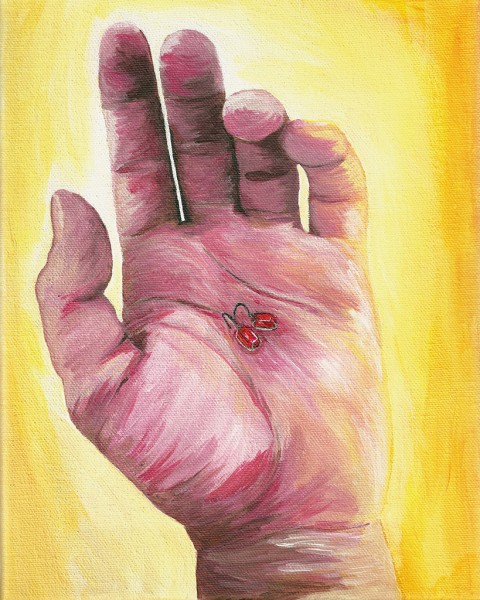He lives on an orange houseboat when he’s home and sometimes he fights in wars. He tells me of course. Of course he’s killed a man with his bare hands. He says of course like he’s digging a deep hole—a small, sharp shovel stabbing a whopping rock. I want him to show me. I motion for him to stand up and I get in front of him, press my back against his chest, pull his arms around me and wrap one around my neck. Press my palm against his pointy elbow. Show me. Pressing and pressing. (The whole world is my palm pressing against his pointy elbow, his hips against my hips.) I ask him if he’s okay. He nods into the back of my neck, slides his arms down and tugs at the hem of my dress, lets his fingertips brush the bare skin of my thighs. I wiggle away and we sit back down at the table. He slides his playing cards over and picks them up slowly, fans them out, switches them around. We play Two-handed Rook with the windows open until I feel like a drip candle melting down the neck of a wine bottle. The summer storm sends us to bed; his navy blue sheets, a white flag. He holds out his hand for my earrings; jewels the size of sweat bees, the color of sunlit cough syrup. He puts them in the jewelry box along with the other treats collected from mysterious, foreign cities. The names, rolling languages that feel good in my mouth. Sweet sounds, hard and bright like frozen blueberries against the inside of my cheeks, glassing across my teeth, hissing on my warm tongue. That was years ago, the time he came home with a dirty face, smelling like campfires and spiced rain and asked me to marry him. The time I laughed (coy as white clover) and told him to ask me again later. Later. I am still waiting. I am the water holding up the house. Sometimes we’re not even humans, we’re fucking animals—rubbing noses and sniffing each other. Sometimes we take bloody knives, carve our initials into thick, tall trees that haven’t been planted yet. His heart is a heavy, loaded gun he hands over to me, lets me spin on my finger. Wait don’t shoot. The overgrown garden of what we don’t say, fecund in our hothouse mouths. Every kiss is a war. I write ask me again, yes on a piece of paper, burn it in a jar. I write sometimes we both fight in wars on the bathroom mirror in cherry blossom-pink lipstick; wine-breath-whisper it into his ear while he’s sleeping.

Notes from Guest Reader April Bradley
The exquisitely crafted ‘Sometimes We Both Fight In Wars’ includes the titular line of Lisa Cross-Smith’s short story collection, Every Kiss A War. It’s an unforgettable story. The lovers we meet here are broken and messy but move toward glittering hope. It contains vivid character, voice, tension, and yearning described in language and deep humanity reminiscent of Joyce, Morrison, and Carver. But Leesa Cross-Smith reminds me of none more than herself because her work is so wonderfully unique. ‘Sometimes We Both Fight In Wars’ is the high art of flash. Enjoy more of Lisa Cross-Smith’s short-form writing in her new collection, So We Can Glow.


 The core workshop of SmokeLong Fitness is all in writing, so you can take part from anywhere at anytime. We are excited about creating a supportive, consistent and structured environment for flash writers to work on their craft in a community. We are thrilled and proud to say that our workshop participants have won, placed, or been listed in every major flash competition. Community works.
The core workshop of SmokeLong Fitness is all in writing, so you can take part from anywhere at anytime. We are excited about creating a supportive, consistent and structured environment for flash writers to work on their craft in a community. We are thrilled and proud to say that our workshop participants have won, placed, or been listed in every major flash competition. Community works.